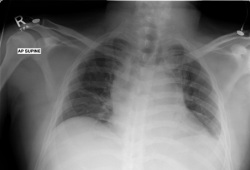Summary
Definition
History and exam
Key diagnostic factors
- lymphadenopathy
Other diagnostic factors
- unexplained fevers
- night sweats
- weight loss
- dyspnea
- cough
- chest pain
- superior vena cava syndrome (SVCS)
- abdominal pain
- pruritus
- alcohol-induced pain at involved sites
- hepatomegaly and/or splenomegaly
- tonsillar enlargement
Risk factors
- age 20-34 years and >55 years
- history of Epstein-Barr virus (EBV) infection
- family history of Hodgkin lymphoma
- young adults from higher socioeconomic class
- human leukocyte antigen (HLA) types
- Jewish ancestry
Diagnostic tests
1st tests to order
- CBC with differential
- comprehensive metabolic panel
- erythrocyte sedimentation rate (ESR)
- thyroid function tests
- screening for HIV, hepatitis B, hepatitis C
- CXR
- PET/CT scan
- contrast-enhanced CT (neck, chest, abdomen, pelvis)
- excisional lymph node biopsy or core biopsy
- immunohistochemical studies
Tests to consider
- bone marrow biopsy
- echocardiogram or multigated acquisition (MUGA) scan
- pulmonary function tests
Treatment algorithm
early (stage I to II) classical HL: favorable disease and intended for combined-modality therapy
early (stage I to II) classical HL: favorable disease and intended for chemotherapy alone
early (stage I to II) classical HL: unfavorable disease (non-bulky or bulky) and intended for combined-modality therapy
early (stage I to II) classical HL: unfavorable disease (non-bulky) and intended for chemotherapy alone
early (stage I to II) classical HL: unfavorable disease (bulky) and intended for chemotherapy alone
early (stage I to II) classical HL: unfavorable disease and intended for alternative induction therapy
advanced (stage III to IV) classical HL: intended for intensive induction chemotherapy
advanced (stage III to IV) classical HL: intended for standard induction therapy (chemoimmunotherapy)
advanced (stage III to IV) classical HL: intended for standard induction therapy (chemotherapy)
asymptomatic early (stage IA to IIA) NLPHL, non-bulky disease
asymptomatic early (stage IA to IIA) NLPHL, bulky disease; and symptomatic early (stage IB to IIB) NLPHL
advanced (stage III to IV) NLPHL
refractory or relapsed classical HL
refractory or relapsed NLPHL
Contributors
Authors
Alison Moskowitz, MD
Associate Attending
Lymphoma Service
Memorial Sloan-Kettering Cancer Center
New York City
NY
Disclosures
AM has received research support from ADC Therapeutics, Beigene, Miragen, Seattle Genetics, Merck, Bristol-Myers Squibb, Incyte, and SecuraBio. AM has received honoraria from Seagen, Affimed, Astra Zeneca, Bio Ascend, Imbrium Therapeutics L.P./Purdue, Janpix Ltd., Merck, Seattle Genetics, Pfizer, Tessa Therapeutics and Takeda. AM is an author of several references cited in this topic.
Acknowledgements
Dr Alison Moskowitz would like to gratefully acknowledge Dr Chris R. Kelsey, Dr Leonard R. Prosnitz, and Dr Timothy M. Zagar, the previous contributors to this topic.
Disclosures
CRK, LRP, and TMZ declare that they have no competing interests.
Peer reviewers
Snegha Ananth, MBBS
Assistant Professor
Division of Oncology & Hematology
University of Nebraska Medical Center
Omaha
NE
Disclosures
SA declares that she has no competing interests.
Christopher D'Angelo, MD
Assistant Professor
Division of Oncology & Hematology
University of Nebraska Medical Center
Omaha
NE
Disclosures
CDA declares that he has received consulting fees from Abbvie, Beigene, Genmab, Curis Inc, Bristol Myers Squibb.
Peer reviewer acknowledgements
BMJ Best Practice topics are updated on a rolling basis in line with developments in evidence and guidance. The peer reviewers listed here have reviewed the content at least once during the history of the topic.
Disclosures
Peer reviewer affiliations and disclosures pertain to the time of the review.
References
Key articles
Cheson BD, Fisher RI, Barrington SF, et al. Recommendations for initial evaluation, staging, and response assessment of Hodgkin and non-Hodgkin lymphoma: the Lugano classification. J Clin Oncol. 2014 Sep 20;32(27):3059-68.Full text Abstract
National Comprehensive Cancer Network. NCCN clinical practice guidelines in oncology: Hodgkin lymphoma [internet publication].Full text
Eyre TA, Cwynarski K, d'Amore F, et al. Lymphomas: ESMO clinical practice guideline for diagnosis, treatment and follow-up. Ann Oncol. 1 Aug 2025: S0923-7534(25)00911-1.Full text Abstract
Reference articles
A full list of sources referenced in this topic is available to users with access to all of BMJ Best Practice.

Differentials
- Non-Hodgkin lymphoma (NHL)
- Lymphadenopathy from other malignancies
- Infectious mononucleosis
More DifferentialsGuidelines
- NCCN clinical practice guidelines in oncology: Hodgkin lymphoma
- Lymphomas: ESMO clinical practice guideline for diagnosis, treatment and follow-up
More GuidelinesLog in or subscribe to access all of BMJ Best Practice
Use of this content is subject to our disclaimer